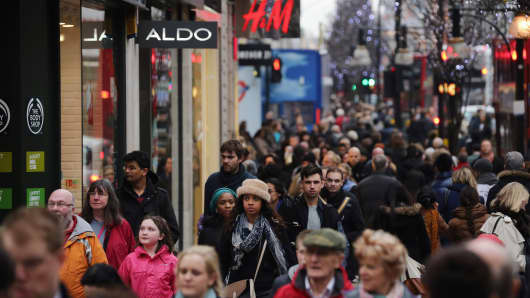Inflation in Britain slipped in July, according to the U.K.'s Office of National Statistics (ONS) on Tuesday, while house prices rose rapidly, causing some to fear the beginnings of a housing bubble.
Consumer prices inflation fell to 2.8 percent in July, from the previous month's 2.9 percent,in line with a Reuters poll. Markedly lower prices for clothing and footwear for summer sales helped push this rate of consumer prices index (CPI) inflation lower.
The figures were in line with expectations from the Bank of England (BoE), which said it expected inflation to average 2.82 percent in the third quarter at its quarterly inflation report last week.
"July's dip in inflation will be well received by the Bank of England as it supports hopes that consumer price inflation is near to peaking, and may even have done so. This may help to dilute current market doubts that the Bank of England will not raise interest rates before 2016," Howard Archer, chief U.K. and European economist at IHS Global Insight, told CNBC.
"We expect the Bank of England to keep interest rates at 0.50 percent through to early-2016, but we believe they could start rising gradually early in 2016."
On Wednesday, BoE Governor Mark Carney said the central bank would not raise interest rates until U.K. unemployment hits 7 percent, seeking to push back expectations of a rate hike to 2016.
Meanwhile, the rate of retail prices index (RPI) inflation, which includes some housing costs and is used to calculate pensions, also fell as expected, to 3.1 percent in July.
(Read More: UK u-turn: yet another growth forecast upgrade)
But there were signs of price pressures in the housing market, with U.K. house prices rising 3.1 percent in the 12 months to June, according to the ONS - the fastest rise since December 2012
The data follows an industry survey which confirmed a strengthening in housing market conditions. The Royal Institution of Chartered Surveyors' seasonally adjusted house prices balance jumped to 36 in July, from 21 in June and just 5 in May, marking one of the sharpest improvements over a three-month period since the survey began in 1978.
(Read more: UK housing recovery spurs 'bubble' warnings)
Archer said this momentum in housing market activity could increase more in the coming months, boosting fears of a housing bubble. House prices in London, for instance, are already 8 percent higher than they were a year ago.
"There is a mounting danger that house prices could really take off further out, especially as a shortage of new properties for sale could be a significant factor in some areas, notably London and the South East," he said.
"While an improving housing market is helpful to growth prospects, it is vitally important for stability and longer-term growth prospects that a new housing price bubble does not emerge."
Jonathan Tepper, chief executive officer at research firm Variant Perception, also warned of the dangers of a housing bubble. He criticized "completely idiotic and insane policies" like the "Help to Buy" scheme.
"It's no wonder that British house prices are rising - higher house prices help hardly anyone," he said. "It won't be a popular thing to say given that Carney seems to be a hero in the City but when he was head of the Bank of Canada he oversaw one of the biggest housing bubbles in the world."
Neil Prothero, UK Analyst at The Economist Intelligence Unit pointed out the inflation-busting rise in house prices were "celebrated by ministers and media", but pointed out that there was still little sign of an accompanying rise in housing construction.
"The government's clear ambition to trigger a mini house-price boom (bubble) in the south-east of England in the run-up to the general election in 2015 appears well on course," he said.
- By CNBC's Holly Ellyatt, follow her on Twitter @HollyEllyatt



